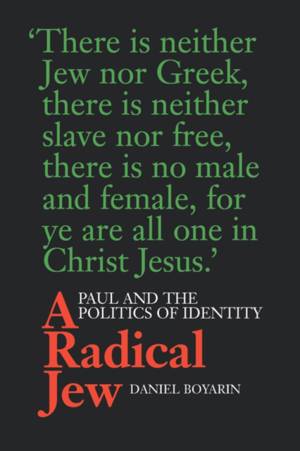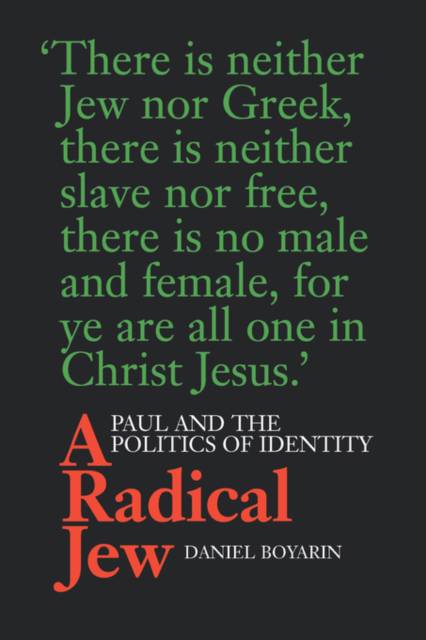
Je cadeautjes zeker op tijd in huis hebben voor de feestdagen? Kom langs in onze winkels en vind het perfecte geschenk!
- Afhalen na 1 uur in een winkel met voorraad
- Gratis thuislevering in België vanaf € 30
- Ruim aanbod met 7 miljoen producten
Je cadeautjes zeker op tijd in huis hebben voor de feestdagen? Kom langs in onze winkels en vind het perfecte geschenk!
- Afhalen na 1 uur in een winkel met voorraad
- Gratis thuislevering in België vanaf € 30
- Ruim aanbod met 7 miljoen producten
Zoeken
Omschrijving
Daniel Boyarin turns to the Epistles of Paul as the spiritual autobiography of a first-century Jewish cultural critic. What led Paul--in his dramatic conversion to Christianity--to such a radical critique of Jewish culture?
Paul's famous formulation, "There is neither Jew nor Greek, no male and female in Christ," demonstrates the genius of Christianity: its concern for all people. The genius of Judaism is its validation of genealogy and cultural, ethnic difference. But the evils of these two thought systems are the obverse of their geniuses: Christianity has threatened to coerce universality, while ethnic difference is one of the most troubled issues in modern history.
Boyarin posits a "diaspora identity" as a way to negotiate the pitfalls inherent in either position. Jewishness disrupts categories of identity because it is not national, genealogical, or even religious, but all of these, in dialectical tension with one another. It is analogous with gender: gender identity makes us different in some ways but not in others.
An exploration of these tensions in the Pauline corpus, argues Boyarin, will lead us to a richer appreciation of our own cultural quandaries as male and female, gay and straight, Jew and Palestinian--and as human beings.
Paul's famous formulation, "There is neither Jew nor Greek, no male and female in Christ," demonstrates the genius of Christianity: its concern for all people. The genius of Judaism is its validation of genealogy and cultural, ethnic difference. But the evils of these two thought systems are the obverse of their geniuses: Christianity has threatened to coerce universality, while ethnic difference is one of the most troubled issues in modern history.
Boyarin posits a "diaspora identity" as a way to negotiate the pitfalls inherent in either position. Jewishness disrupts categories of identity because it is not national, genealogical, or even religious, but all of these, in dialectical tension with one another. It is analogous with gender: gender identity makes us different in some ways but not in others.
An exploration of these tensions in the Pauline corpus, argues Boyarin, will lead us to a richer appreciation of our own cultural quandaries as male and female, gay and straight, Jew and Palestinian--and as human beings.
Specificaties
Betrokkenen
- Auteur(s):
- Uitgeverij:
Inhoud
- Aantal bladzijden:
- 400
- Taal:
- Engels
- Reeks:
- Reeksnummer:
- nr. 1
Eigenschappen
- Productcode (EAN):
- 9780520212145
- Verschijningsdatum:
- 11/11/1997
- Uitvoering:
- Paperback
- Formaat:
- Trade paperback (VS)
- Afmetingen:
- 156 mm x 227 mm
- Gewicht:
- 580 g

Alleen bij Standaard Boekhandel
+ 108 punten op je klantenkaart van Standaard Boekhandel
Beoordelingen
We publiceren alleen reviews die voldoen aan de voorwaarden voor reviews. Bekijk onze voorwaarden voor reviews.









